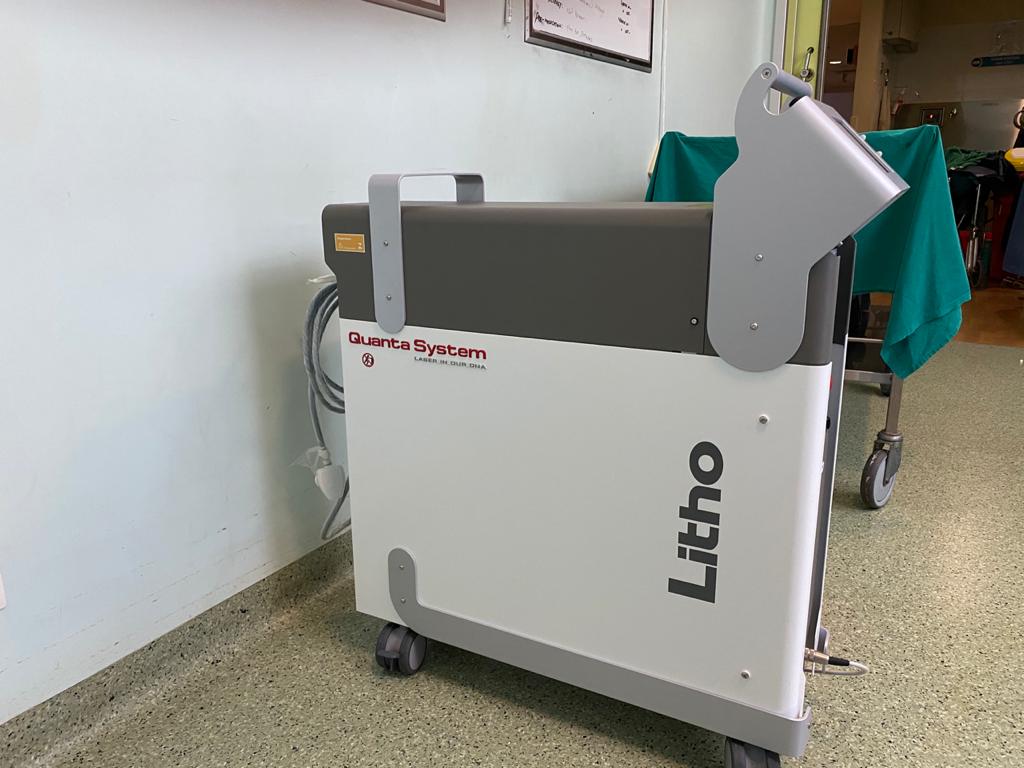Kidney Stone Treatment in Pune
Kidney stones are small, hard deposits that form within your kidneys. The stones are made of mineral and acid salts. Kidney stones include many causes and can affect any part of your urinary tract — from your kidneys to your bladder. Often, stones shape when the urine becomes concerted, allowing minerals to shape up and stick together.
Transient kidney stones can be quite painful, but the stones regularly cause no permanent damage. Depending on your situation, you may need nothing more than to take pain medicine and drink lots of water to pass a kidney stone. In other instances, surgery may be needed. A doctor may suggest preventive treatment to reduce your risk of recurrent kidney stones if you’re at increased risk of developing them again.
Dr. Suraj Lunavat provides the best Kidney Stone Treatment in Pune, he is the most popular and best Kidney Stone Specialist in Pune with 100% successful results among his patients. For the purpose of attaining the utmost patient approval and satisfaction, Dr. Suraj Lunavat follows quality focus approach for his patient. The quality of kidney treatment service is never compromised by Dr. Suraj Lunavat to ensure optimum standards of effectiveness and quality. By rendering the endoscopic surgery at cost-effective charges.

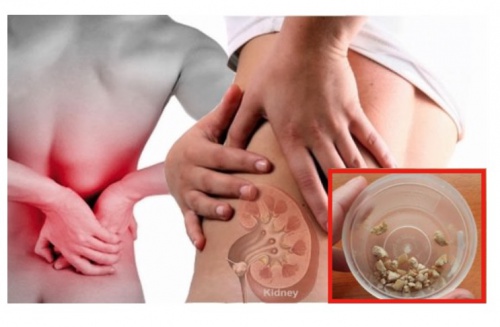
Symptoms of Kidney Stones
The main symptom is severe pain that starts suddenly and may go away suddenly:
- Pain may be felt in the belly area or side of the back
- Pain may move to groin area (groin pain) or testicles (testicle pain)
- Other symptoms can include:
- Abnormal urine color
- Blood in the urine
- Chills
- Fever
- Nausea
- Vomiting
Medicines:
A doctor prescribes certain medications to help prevent calcium and uric acid stones. These medicines control the amount of acid or alkali in the urine, key factors in crystal formation. The medicine allopurinol may also be useful in some cases of hyperuricosuria. We usually try to control hypercalciuria, and thus prevent calcium stones, by prescribing certain diuretics, such as hydrochlorothiazide. These medicines decrease the amount of calcium released by the kidneys into the urine by favoring calcium retention in bone. They work best when sodium intake is low.
Small stones (< 6 mm) lying in the lower half of the ureter can be given a trial of medicine, involving antibiotics, painkillers, and medicines to relax the ureter. Persistence of pain, stone remaining at the same place for > 2 weeks, or development of fever with chills warrants immediate surgical intervention. Any stone obstructing the kidney/ ureter for > four weeks can cause permanent damage to the kidney. Your Doctor may also recommend you have a proper diet for a kidney stone.


ESWL (Lithotripsy)
This is a non-invasive treatment wherein; stones are broken by shock waves generated by the machine. The patient lies on the table and focused shock waves are targeted on the stone. The stone is fragmented into small pieces, and are gradually washed out of the body in the urine. Stones up to size one to two cm, favorably placed in the urinary system can be effectively treated by this system with clearance rates ranging from 50% to 90%.
Advantage: Avoiding anaesthesia and surgery, no risk of blood loss
Disadvantage: Possibility of incomplete clearance; need for multiple sessions, re-treatment.
RIRS (Retrograde Intrarenal Surgery):
Kidney Stones are burned with LASER using a specialized very thin flexible ureterorenoscopy. This is a scar-less procedure in which the stone is accessed using the natural tract.
Retrograde intrarenal surgery (RIRS) is a procedure for doing surgery within the kidney using a viewing tube called a fiberoptic endoscope. The scope thus is moved retrograde (up the urinary tract system) to within the kidney (intrarenal). This is our specialty. We have the latest state-of-the-art technology.
Equipment & Techniques:
The following list details the preferred equipment and materials for ureterorenoscopy.
- Fluoroscopy ( C-arm)
- Ureteroscopes, rigid/flexible
- Guidewires (a variety)
- 5 fr ureteric catheter
- Contrast medium
- Ureteric access sheath
- Holmium: YAG laser (with a laser fiber, 365 or 200 ìm)
- Stone baskets (a variety)
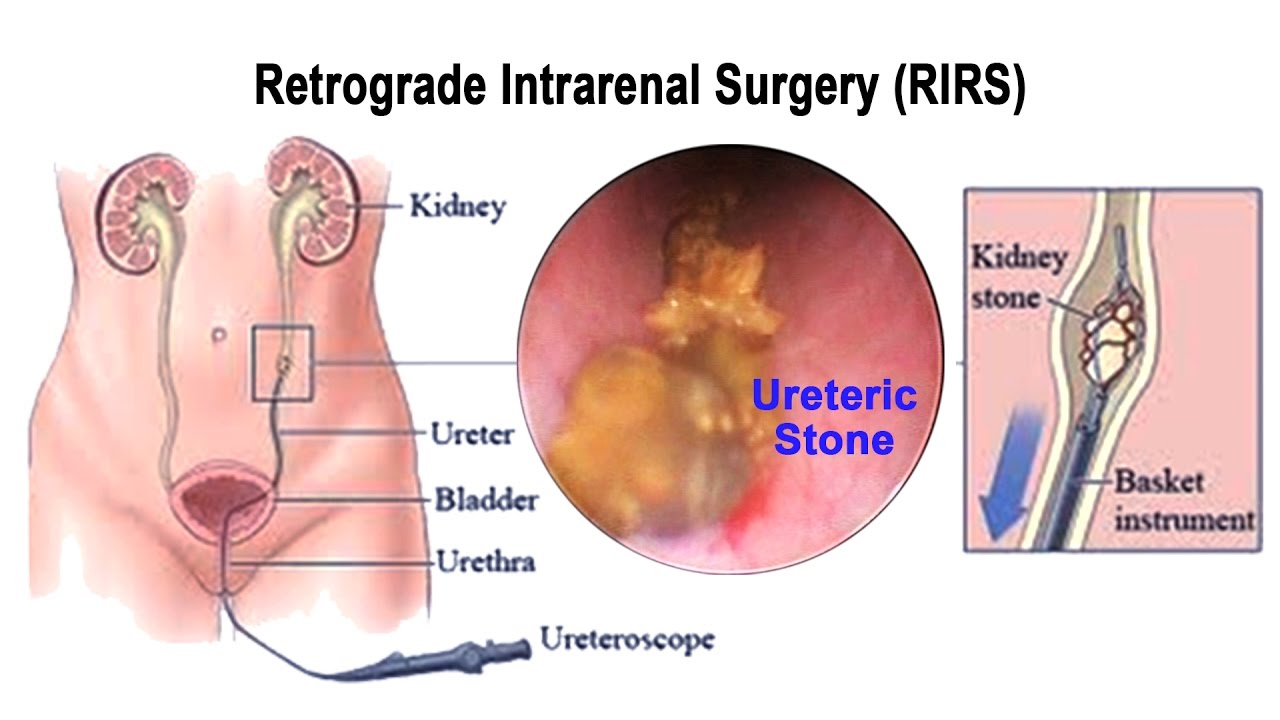
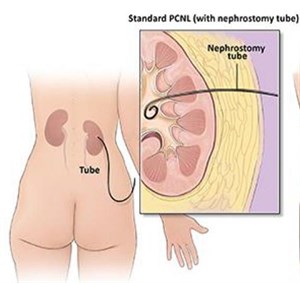

PCNL (percutaneous nephrolithotomy or stone extraction):
This procedure of removal of stone from a 1 cm incision using a nephroscope has revolutionized the treatment of stone. In the hands of experts, >95% clearance rates are achieved, even in large-sized stones. In uneventful surgery, all tubes are removed and patient is discharged on 3rd to 4th day after surgery. These high success rates are associated with small risk of excessive bleeding requiring blood transfusion or severe infection.
PCNL is required if: –
- A patient has a large stone burden (classically more than 2 cm). At times the entire kidney is filled with branched stones (staghorn calculus), or if there are multiple large stones in all calyces of the kidney.
- In cases of stones that have not been fragmented after ESWL (Extracorporeal Shock Wave Lithotripsy).
- Stones in locations of the kidney that are not suitable for removal using a flexible ureteroscope, i.e. RIRS (Retrograde Intra-Renal Surgery).
- In certain cases of malformed kidneys such as horseshoe kidneys where one can attempt a laparoscopic-assisted PCNL.
What are the advantages of PCNL over open surgery for stone removal?
- Avoidance of a large skin incision which in turn is cosmetically better.
- Experience less post-operative pain
- Earlier resumption of a normal diet
- Early ambulation of the patient
- Early recovery and hence early return to work/normal activities.
This surgery is not advised in certain conditions such as: –
- If there is a urinary tract infection. A sterile urine culture is a prerequisite to this surgery. In the case of documented urine infection, the patient needs to be treated with antibiotics and a urine culture repeated to confirm the absence of infection.
- In patients who are on blood thinners, in such cases, the medicines need to be stopped for 7-10 days in consultation with the physician who prescribed them.
- This procedure is not done for pregnant patients because of the fluoroscopy (X-ray exposure) involved.
URS (Ureteroscopy):
Stones lying in the ureter are removed with the help of a specialized scope.
Ureteroscopy is an examination of the upper urinary tract, usually performed with a ureteroscope that is passed through the urethra and the bladder, and then directly into the ureter.
With so many technological advancements that had come up there is no doubt. That you get the best of the medical help at great pricing. Taking of which, Ureteroscopy is one such process that is a perfect example of technology. In this process, there is a small yet flexible telescope called ureteroscope which is inserted in the ureter and bladder. It is done in such a way that stones can be detected in the right manner along with some other problems. If there are any that are related to urinary tract. The surgeon with the help of such process can examine the ureteral stone. Which is located inside the ureter without any kind of problem.
It is one of the popular processes to detect stones in the ureter as it gives accurate results in less time span. Under this Ureteroscopy surgery in Pune. The doctor inserts a small yet flexible forceps in the bladder to the lower ureter which automatically collects the stones and pulls them. The surgery is also an outpatient process that can only be performed by the expert with years of experience in this field. With this process, the surgeon can access the 2/3rd of ureter without any kind of hassle. If you are planning to get this treatment done, make sure you are pretty much careful with the surgeon that you choose.
The best part about this treatment process is along with diagnosing. It can also help you get rid of number of stones irrespective of the size. As long as you have ureteroscopy performed by the doctor. You can be relaxed by the fact that you will get best solution. This treatment as compared to ESWL treatment is the best one to deal with. It includes the kidney stone fragmentation done with the help of helium laser device. It is undoubtedly secured and of course gives the best possible results. Once the treatment is over, no doubt that recovery process can be pretty quick, but you need to also understand that you must pay extra attention with the diet plan you follow.
How is Ureteroscopy performed?
Under this process, your local anesthetist will give you a dose by which there will not be any kind of sensation in the ureter. Then doctor will insert the ureteroscope into the urethra while sliding it into the bladder. There is a sterile liquid which flows throughout the scope to make sure it fills bladder. So, that the stretch can be easily achieved to make it convenient for the doctor to view the wall of the bladder. Once the bladder gets filled with liquid, patient usually feels discomfort and want to urinate. Doctor of course would release some liquid or employ the bladder the moment examination is done.
During the time of scope insertion till the removal of the same, there are few minutes in which doctor will decide the problem and accordingly treat it. Once the biopsy is done by taking the small sample of the tissue the process can last longer.
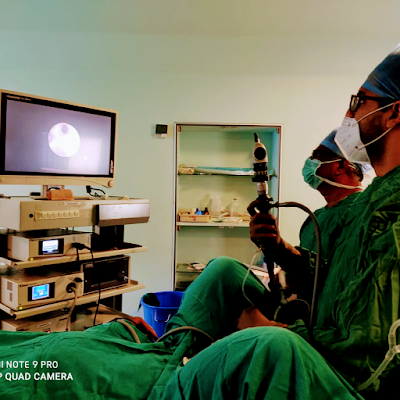
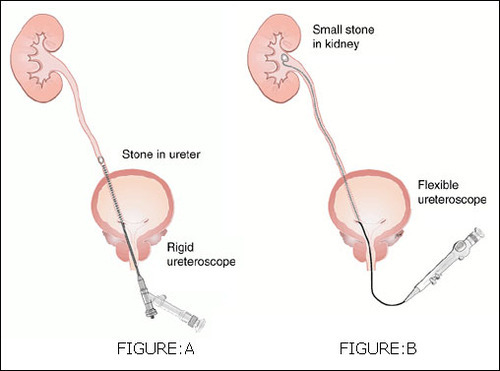

Open surgery:
In the modern era of spectacular technological advancement, this is like Stone Age. In modern urology practice, open stone removal is rarely required. The long incision required for kidney stones is associated with a number of disadvantages like long convalescence, big, unsightly scar, and weakness to body wall.
Frequently Ask Questions on Kidney Stone?
WHAT ARE THE SYMPTOMS OF THE PRESENCE OF KIDNEY STONES?
The presentation of symptoms depends upon the location, size, and shape of the stone. Many times they are symptom free. They are called silent stones. Common symptoms are as follows:
- Sudden, severe pain- starting in the flanks and moving towards groins. Typically, described as ureteric colic and loin to groin pain
- Nausea and Vomiting.
- Blood in Urine.
- Increased Urinary frequency.
- Burning sensation on passing Urine.
- Infection in Urine.
WHAT CAUSES STONE FORMATION?
Various factors play a role in the formation of kidney stone in a susceptible individual. These factors are diet, water intake, urinary output, climate, occupation, and heredity, radical and family background.
1. Diet- Ingestion of excessive amount of calcium, oxalates, purines (uric acid), phosphates and other elements often results in excessive excretion of these components in the urine. The stone formation can be precipitated by high intake of calcium in the form of milk, ice creams, cheese, chocolates, cocoa, calcium containing drugs or vitamin D.
2.Water Intake and Urinary Output- It has been well established that increased water intake and increased urinary output decrease the incidence of urinary stone in patients predisposed to the disease.
3.Climate- High environmental temperature increases sweating, which may result in increased concentration of urine. This hyper concentration may contribute to stone formation.
4. Occupation- Stone disease is more likely to be found in individuals with sedentary occupation like professionals and managerial class rather than unskilled and partly skilled labourers.
5. Genetic Disorders- Like Gout, Cystinuria, primary Oxaluria, metabolic disorders like bowl, endocrine and kidney problems that increase blood and urine calcium and oxalates can promote the tendency for stone formation. Other rarer conditions like rickets, hyperparathyroidism and demineralization of bone may lead to stone formation.
6. Obstruction and Infection- Due to stricture or enlarged prostate may cause stagnation of urine leading to stone formation. Chronic infection in the kidney may also allow stone formation around the debris in the urine.
DOES WATER HELP IN FLUSHING OUT THE STONES?
Yes. Water helps in flushing out the stones. But fortunately, not all stones, stones which are in the size range of 3-6 mm can be passed out with the increased intake of the water
WILL MY CHILDREN GET STONES BECAUSE I HAVE THEM?
Any person with a family history of stones may be at higher risk. Stone disease in a first degree relative, such as a parent or sibling, can dramatically increase the probability for you. In addition, more than 70 percent of people with certain rare hereditary disorders are prone to the problem.
WHO HAVE GREATER TENDENCY TOWARDS KIDNEY STONES?
- People who tend to form stones have certain factors in common.
- Those who stay in the hot environmental condition, such as tropical areas.
- Positive family history of the stone disease in first blood relation.
- Decreases fluid intake, which reduces urine output, and forms supersaturated urine.
IS THE TREATMENT POSSIBLE IN PATIENT WITH DIABETES, BLOOD PRESSURE AND HEART DISEASE?
Lithotripsy is safest with above diseases as it is totally non-invasive procedure. However, one should keep these diseases under control when treating with Lithotripsy.
Hi-Tech Infrastructure:
Quanta 35 watt Holmium LASER
Dr. Suraj Lunavat provides kidney stone treatment in pune with use of latest technology and equipments. It helps in quick recovery of patients with very good results . Urology branch is very much dependent on equipment and we strive to provide best urology care to our patients by continued upgradation of our infrastructure . In today’s times LASER is the backbone of kidney stone treatment as it is minimally invasive with swift recovery and short hospital stay .
